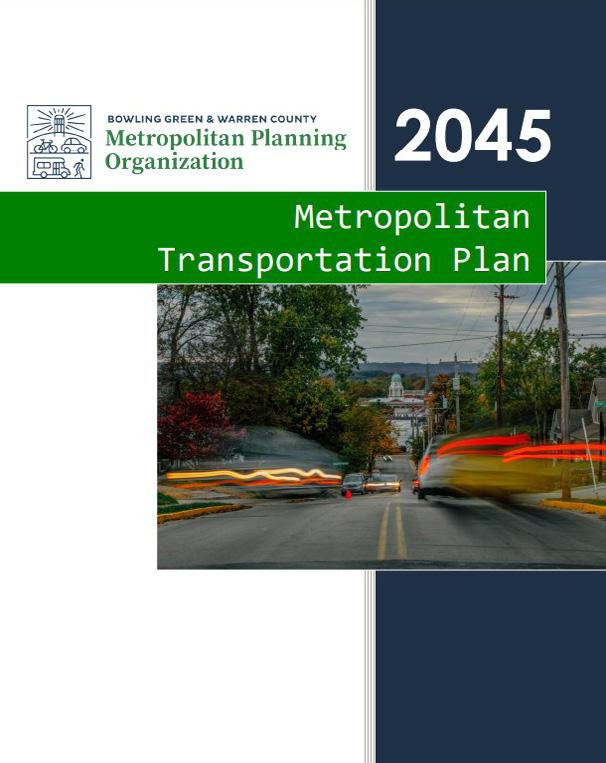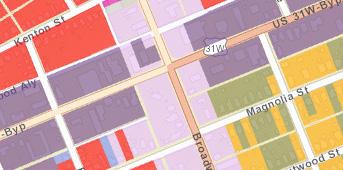
4 minute read
SECTION 1: WHAT IS PLANNING? Overview of planning and introduction to the key players in the planning process in Bowling Green
SECTION 1: WHAT IS PLANNING?
Planning is a visionary, technical, and political process that takes place primarily at the local government level. A plan focuses on the needs of the community such as housing, transportation, and job creation. Plans also focus on the wants of the community and should be visionary exercises that manifest in a higher quality of life overall.
Advertisement
There are typically three main forms of planning at the local government level.
• Long-Range Planning
20-30 yrs
• Short-Range Planning
• Current Planning
5-10 yrs Ongoing
Long-range planning includes comprehensive plans, transportation plans, special geographic area plans, and neighborhood plans that set the stage for twenty to thirty years in the future. Some cities create long-term plans for more specific issues such as housing, parks and open space, and fiscal sustainability. Short-range plans include planning documents with a timeline of 10 years or less. These plans guide policy and funding and are often created to organize priorities for projects that utilize federal funds. Popular short-range plans are transportation improvement plans and housing strategic plans. Current planning initiatives implement the short-range and long-range plans. Current planning includes drafting and adopting land use regulations, reviewing new development proposals, and enacting programs to achieve the goals laid out in the plans. WHAT ARE COMPREHENSIVE PLANS? Comprehensive plans are overarching planning documents to which other more specific plans and regulations should adhere. Comprehensive plans lay out the overall vision and plan for growth, development, and preservation of land for the planning area. Cities cannot adopt land use regulations such as a zoning ordinance without the adoption of a comprehensive plan. Long-range plans and studies serving Bowling Green, KY: • Focus 2030 Comprehensive Plan • 2045 Metropolitan Transportation Plan • Scottsville Road Corridor Study • Plano Focal Point Plan
Short-range plans serving Bowling Green, KY: • Transportation Improvement Program

While a planning effort and a comprehensive plan can produce benefits, it’s a mistake to believe that planning has all the answers and is a “cure-all” for whatever ails the community. Planning can produce positive results if it is understood and supported by the Planning Commission, the governing bodies, and local residents. The following limitations, however, should be noted:
• Planning cannot produce miracles and cannot be expected to suddenly cure all of a community’s ills. It is not a shortterm proposition, but a medium to long-term undertaking.
• Planning cannot be used to exclude newcomers to the community nor can it be used to prevent change or to keep everything in the community just the way it is.
• Planning cannot be a device for problem-solving or a means of avoiding mistakes unless it has credibility among residents and is supported by elected and appointed public officials.
• Planning cannot succeed without implementing the policies contained in the planning document. Planning needs some sort of action program to carry out its objectives.
• Planning is more difficult if it fails to balance competing points of view in the community. A successful planning effort brings all perspectives to the table.
• Planning cannot work to the benefit of your community unless you want it to. City-County Planning Commission Bowling Green is served by a joint planning unit called the City-County Planning Commission (CCPC). The CCPC serves all of Warren County including the incorporated cities within the county. The CCPC is both an appointed board of 12 people and an organization. The Mayor of Bowling Green appoints 4 citizens to the CCPC for four-year terms. The rest are appointed by the county, Smiths Grove, Woodburn, Plum Springs, and Oakland. Metropolitan Planning Organization The Metropolitan Planning Organization (MPO) is within the CCPC. The appointed members of the CCPC oversee the staff and budget of the organization including that of the MPO. The MPO is a federal requirement and one of its main functions is to facilitate federal funding for transportation projects and programs. The MPO focuses on roads and transportation planning.
Bowling Green City Commission The City Commissioners are your elected officials, and they are the legislative arm of the city. Although the CCPC makes recommendations to them in various planning scenarios, the City Commission ultimately makes the decisions. There are some exceptions where the Planning Commission or the Board of Adjustments make final decisions. Board of Adjustments The Board of Adjustments is a joint city-county board that addresses special and unique situations related to the Zoning Ordinance. This board handles appeals from any order, requirement, decision, or action of any zoning official regarding the provisions of the Zoning Ordinance.
Warren County
The Warren County Judge-Executive appoints 4 commissioners, the Mayor of Bowling Green appoints 4 commissioners, and then the Mayor of each of the other incorporated cities appoints 1 commissioner.
Plum Springs
Bowling Green Smiths Grove
Oakland
Woodburn

City-County Planning Commission Board







